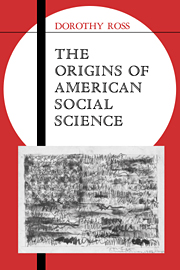Book contents
- Frontmatter
- Contents
- Acknowledgments
- Abbreviations used in the footnotes
- Introduction
- Part I European social science in antebellum America
- 1 The discovery of modernity
- 2 The American exceptionalist vision
- Part II The crisis of American exceptionalism, 1865–1896
- Part III Progressive social science, 1896–1914
- Part IV American social science as the study of natural process, 1908–1929
- Epilogue
- Bibliographical note
- Indexes
- Ideas in Context
2 - The American exceptionalist vision
Published online by Cambridge University Press: 23 September 2009
- Frontmatter
- Contents
- Acknowledgments
- Abbreviations used in the footnotes
- Introduction
- Part I European social science in antebellum America
- 1 The discovery of modernity
- 2 The American exceptionalist vision
- Part II The crisis of American exceptionalism, 1865–1896
- Part III Progressive social science, 1896–1914
- Part IV American social science as the study of natural process, 1908–1929
- Epilogue
- Bibliographical note
- Indexes
- Ideas in Context
Summary
Americans participated in the discovery of modern society that occupied European social thinkers in the late eighteenth and early nineteenth centuries, but put that discussion and its social scientific discourse to a partially distinctive use. Many of the cultural components that developed in Europe into historicism were also present – Protestant Christianity, the secular Enlightenment, republican political discourse, and romanticism. Yet historicism did not develop contemporaneously in America and indeed made little headway until late in the nineteenth century. Engaged in founding and defining their national existence, Americans developed from these cultural resources a different historical consciousness, and with it a variant social scientific tradition.
The national ideology of American exceptionalism
If America did not follow Europe into historicism, one major factor was that Americans regarded their own revolution, unlike the French, as a success. Americans understood the success of the Revolution and the establishment of republican government in the Constitution as events in Christian and republican time. Protestant Americans already had available a Christian paradigm to which the establishment of the new nation could be assimilated. Reformation prophecy allowed them to believe that the millennium was a progressive historical period on which the Reformed world was about to enter, and the Puritan errand to New England moved the scene of that hope to the New World. When national independence was won, fervent Protestants identified the American Republic with the advent of the millennial period that would usher in the final salvation of mankind and the end of history.
- Type
- Chapter
- Information
- The Origins of American Social Science , pp. 22 - 50Publisher: Cambridge University PressPrint publication year: 1990

